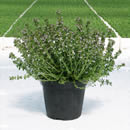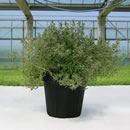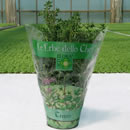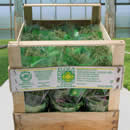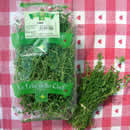Thyme
Dill
Absinthe
Basil
Borage
Calamint
Capers
Chervil
Coriander
Tarragon
Chives
Wild fennel
Lavender
Lovage
Lippia Citriodora
Marjoram
Lemon balm
Mint
Myrtle
Oregano
Chilli pepper
Salad burnet
Parsley
Rosemary
Garden rocket
Rue
Sage
Celery
Thyme
Valerian
HISTORICAL HINTS: Thyme (Thymus vulgaris L.) is an evergreen perennial shrub of the Labiatae family, native to the Mediterranean areas. The plant is a small very brunched shrub which is woody in the inferior part and can be 40 cm tall with several small linear aromatic grey-green leaves and whitish, rose or violet flowers. Thyme has always been very common since the Egyptian era when it was used for embalming, while during the Roman era, the philosopher Apuleius attributed to thyme analgesic properties, according to what is written in his Herbarium in 1481. The Romans also exploited its antiseptic and food preserving properties, soldiers were told to take a bath into thyme water to gain strength (the Greek word Thymos means bravery), while in the Middle Age women embroidered thyme spikes on knight’s badges as a sign of good omen. The Greeks, instead, loved to produce and eat thyme honey and banquet guests were often offered a wine aromatized with thyme, cinnamon and mint before the meal started. Even Scottish highlanders were told to drink wild thyme tea to avoid nightmares and fears.
CULTIVATION, VARIETY AND HARVESTING - Thyme is present in almost all the Italian regions where it grows spontaneously and it is partly cultivated in kitchen garden; it can be found up to 900 m on the sea level on arid, sunny and gravelly soils. There are different varieties of thyme, among which we can find the Thyme Serpyllum owing the best medical properties. Thyme is harvested from May to July cutting the blossomed stems 5-10 cm below the flowers, then it is dried in the shade.
PURCHASING AND PRESERVATION - In supermarkets it is possible to find fresh thyme branches in plastic packages (bag or tray) or dried and minced leaves in plastic or glass packages.
Fresh thyme can be preserved in the fridge for about one week (you can also freeze it) and once it has dried it must be canned in hermetic containers and kept away from direct light for different months.
PROPERTIES - Beside its aromatic characteristics helping reducing headache, thyme is able to extend food preservation thanks also to its antiseptic properties. It also has digestive, depurative, carminative, balsamic, tonic, stimulating properties and it is used to gargle in case of mouth infections. Thyme infusions and syrups tone up organism, stimulate appetite, digestion and liver function, treat the cold; thyme is an effective remedy against airways diseases as cold, bronchitis, pneumonia, emphysema, hooping, and for its balsamic properties it is useful to fluidify catarrh and for asthma. Its antiseptic properties makes it useful also against intestinal fermentation and infection; it is also a good diuretic, able to favour menstruation, stimulate abortion and accelerate delivery, for this reason it should not be taken during pregnancy and breast feeding. Thyme seems to be useful also against Multiple Sclerosis, depression, alcoholism, epilepsy and to stimulate white blood cell production. The steam from its decoction is suitable to relax the face, stimulate circulation and decrease solar stains, in addition in infusion with rosemary it helps eliminating dandruff. Used externally it is a good skin disinfectant and peripheral circulation stimulator; mouth washes with thyme are indicated to eliminate bad breath. P.S. The genre thymus includes almost 350 species of small perennial plant, all rich in thymol, a strong antiseptic. Thyme is also used in cosmetic industries which get serpolyne essence useful to prepare perfumes.
CULINARY USE - Thyme is a very appreciated aromatic plant used in several preparations as soups, vegetables, stuffing, sauces, omelette, roasted and braised meat, mushrooms, aromatic oils and vinegars, but also fish and dried fruits (figs and plums). Added to preserved meat or to brine, it slows down mould formation and make food more digestible (especially game and long cooking meats). Thyme is also used to make liqueurs (Benedictine), wines and aromatic salt.























